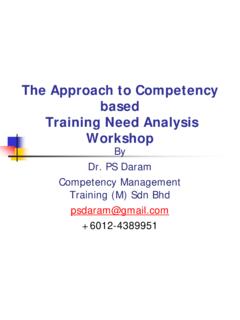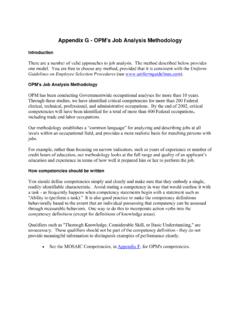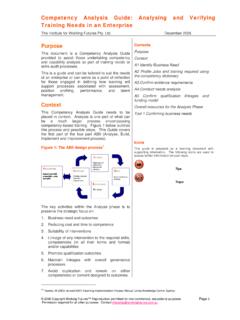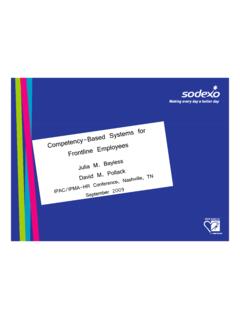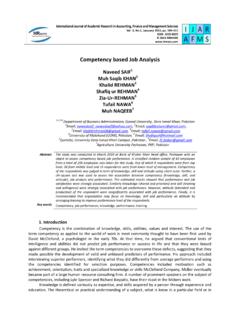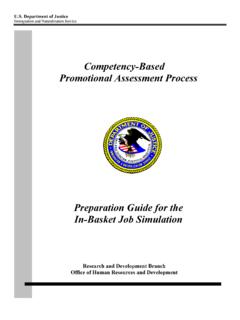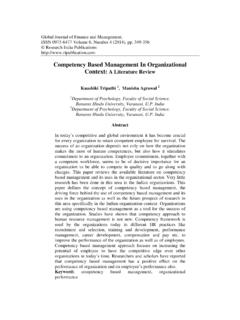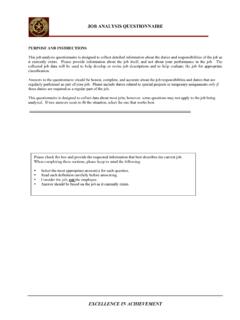Transcription of Competency-Based Assessment: Is It Right for You?
1 Competency-Based assessment : is it Right for You?Presentation for the National Organization for competency AssuranceLearning objectives Understand major concepts related to Competency-Based assessment Using a real life case study, learn how Competency-Based assessment models can play an important role in distinguishing your certification program from both the competition and from educational credentials Evaluate the benefits and challenges of Competency-Based assessments to determine the feasibility of this approach for your programWhy should you be interested incompetency- based assessment ?Why should you be interested? Consumers have become highly educated and demand quality products and services and protection from incompetent practices Pew Commission (1998) recommended that all healthcare professionals be required to meet specific competency requirements throughout their careersWhy should you be interested?
2 In the international context, Competency-Based curricula and assessment are the foundation of credentialing in many professions and in countries In some countries/regions, credentials are perceived as basic or inferior because they are not viewed as being competency basedWhy should you be interested? Not heeding trends in Competency-Based assessment could result in: Loss of public confidence in your profession Additional regulation of your profession Failed efforts to achieve a global reach for your credentials What are the consequences of incompetence?CartoonWhat are the consequences of professional incompetence? Buying a home infested with termites Purchasing a hearing aid that will not help you with your specific hearing problem Having insufficient income for your retirement years Can lead to death re: healthcare professionsWhat are the consequences of incompetence in your profession?
3 Loss of credibility of your certification program and loss of confidence on the part of stakeholders Increased vulnerability to regulation Higher insurance rates and difficulty getting coverage Legal actionHow is competency defined?What is competence? What is a competency ? What are the components of a competency ? competency statement A more global or comprehensive characterization of performance than task, knowledge, skill, or ability statements alone Typically incorporates performance of several related tasks and/or requires the use of a variety of knowledge domains Often indicates something about how the knowledge, skills and abilities are used to carry out the job elementCompetency statement: Example The pharmacy technician can enter demographic and prescription data. VS. The pharmacy technician can verifythat the entry of the demographic and prescription data is accurateand statement: Example The portfolio manager determines an appropriate rebalancing strategy to ensure that an investment portfolio remains consistent with the agreed upon asset allocation guidelines and the client's investment policy statement.
4 The cardiovascular nurse selects the appropriate nursing interventions to reduce current and potential cardiovascular risks at primary, secondary and tertiary levels of Models/FrameworksContinuing competence Can the public be confident that a healthcare professional who demonstrated a minimum level of competence when he/she earned a license continue to be competent years and decades after they have been in practice? (Citizen Advocacy Center, 1995)Does certification assure competency ?What the professions say about their certificationsAmerican Society of Association Executives (ASAE)The CAE program recognizes accepted levels of expertise in the profession with the goal of improving professional standards in association management. However, no certification program can guarantee professional competence.
5 What the professions say about their certificationsAmerican Institute of Certified Public Accountants (AICPA)To admit individuals into the accounting profession only after they have demonstrated the entry-level knowledge and skillsnecessary to protect the public interest in a rapidly changing business and financial environmentWhat the professions say about their certificationsAmerican Board of Internal Medicine (ABIM)Certification is designed to assure the public that the specialist has successfully completed an approved educational program and an evaluation, including a secure examination designed to assess the knowledge, experience, and skillsrequisite to the provision of high-quality patient careWhat the professions say about their certificationsCouncil on Certification of Nurse Anesthetists (CCNA)To protect and serve the public by assuring that the individuals who are credentialed have met predetermined qualifications or standards for providing nurse anesthesia servicesWhat the professions say about their certificationsNational Board for the Certification of Hospice and Palliative NursesCertification involves a process that validates and evaluates one s expertise in a specialty area.
6 While licensure assures minimal competency to practice in a field, certification indicates mastery of a defined body of the professions say about their certificationsAmerican Academy of Nurse Practitioners Certification ProgramThe examinations are Competency-Based and reflective of nurse practitioner knowledge and expertise in each of these specialtiesWhat the professions say about their certificationsProject Management Institute (PMI)Certification connotes the holder as one who has demonstrated the knowledge, experience and leadership skillsrequired to competently practiceproject managementWhat the professions say about their certificationsCFA InstituteThe Chartered Financial Analyst (CFA ) designation is one of the fastest growing professional credentials in the world and is a globally recognized standard for measuring the competenceand integrity of investment professionalsWhat the professions say about their certificationsCertified Financial Planner Board of StandardsThe Certified Financial Planner certification process is the best means of demonstrating financial planner competencyand ethical behaviorWhat attorneys say about certification and competence More accurate to characterize certificants as those who have met criteria of competence -- notas those who are competent Cannot guarantee competence.
7 Only measures factors that may indicate competence Misleading to state that certificants are competent as it implies that noncertificants are incompetent Certification is only one factor that may be used in measuring competenceWhat is Competency-Based assessment ? Competency-Based assessment Evaluates how a range of skills, knowledge and understandings are combined together to successfully complete practical workplace tasks Assesses performance in against pre-defined occupational standards Is outcome-oriented based on criterion-referenced methods; performance is assessed against criteria provided to the candidate; candidate and the assessor are clear on what performance is requiredPerformance criteria: ExampleThe cook selects and prepares correct ingredients and weighs and measures them properly to ensure adherence to the recipe Ingredients selected match recipe Prepares ingredients for weighing/measuring in accordance with measurement standards ( , washes and dices vegetables that should be measured in diced form) Selects correct measuring devices ( , cup, tsp.)
8 For type of ingredients measured Selects correct scale for weight/volume of ingredientWhy have so few certification programs adopted Competency-Based assessments?Types of assessments that might be required Low fidelity, written simulations ( , case studies MCQs) Constructed response questions ( , essay, short answer) Portfolios Oral examinations High fidelity simulations ( , virtual reality, standardized patients) Performance evaluationsOther forms of assessment Record review Chart stimulated recall 360 ratings Procedure or case logs Patient surveyChallenges of Competency-Based assessments Ability to sample all the relevant competencies may be limited Development and scoring are usually expensive and complex Generally expensive to administer Scoring is subjective ( , use of human judges) More difficult to achieve acceptable level of reliability But there are upsides High fidelity to practice Has the appearance of measuring more than knowledge or lower-level cognitive skills May satisfy the needs of the public and other stakeholders for competency assurance Good vehicles for assessing continuing competence (recertification)Is Competency-Based assessment feasible?
9 Cost-benefit analysis , including consideration of: Psychometrics Level of effort required Stakeholder perceptions Fulfillment of missionCartoonCompetency- based assessment and Certification:The Canadian CFP ExperienceCary List, CA, CFPF inancial Planners Standards CouncilA Little About the CFP Founded in the in 1973 Introduced in Canada in 1996, bringing together several long-standing Canadian financial planning designations Currently over 50,000 CFPs in the ,17,000 in Canada, and 100,000 in 18 countries worldwide Represents the gold standard for professional financial planningCFP Historical Approach CFP certification program developed from model Job analysis leading to topics list laying out all of the knowledge required as a CFP professional Lots of work on job analysis ; less empirical work on linking of the resulting tasks list to the topics Examination syllabus based exclusively on topics list Job tasks only used for weighting topics on examinationCFP Program History Certification program requirements: Education Experience Examination All based on syllabus Requirements ultimately based on acquisition of knowledge, not competenceTraditional Approach: Strengths Knowledge- based certification well understood Relatively easy to test with multiple choice Relatively easy to assess Relatively easy to create consistent, reliable exams CFP exam reliability has exceeded Approach: Weaknesses Students: Why do I have to know that CFPs: Getting the designation was not demonstration of my ability to perform financial planning Employers.
10 I hire a CFP, who knows a lot, but we still have to teach them how to be a planner The Public: How do I know exactly what a CFP can do for me? Internationally: A CFP in Canada doesn t mean the same as a CFP in Hong Kong CFP in Canada: A New Approach Embrace and enhance our strengths Acknowledge and addressthe criticismsCFP in Canada: Competency-Based Approach In 2003, FPSC embarked on a new Job analysis project Coined it a competency analysis to emphasize that it wasn t solely about knowledge, or even job tasks, but about competencyCFP in Canada: Competency-Based Approach FPSC approaches competency as follows: Competencies provide a description of the abilities that a CFP professional must possess and represent not just the tasks, but also incorporate the job-related skills, knowledge, attitudes and judgements required for competent performance by members of the profession.
